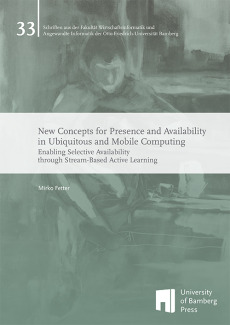Mirko Fetter
New Concepts for Presence and Availability in Ubiquitous and Mobile Computing
Enabling Selective Availability through Stream-Based Active Learning
Reihe: Schriften aus der Fakultät Wirtschaftsinformatik und Angewandte Informatik der Otto-Friedrich-Universität BambergModern Computer-mediated Communication technologies like Instant Messaging (IM) systems enable spontaneous communication over distance. With the advances in Mobile and Ubiquitous Computing, these technologies move away from the desktop computers of our offices, and become more and more pervasive and interwoven with our daily lives. The introduction of these great possibilities to communicate from everywhere with everyone however comes at a cost: The cost of constantly being available to everybody, everywhere, leading to an increasing number of interruptions in our daily tasks. The challenge is, that current technology does not empower users to manage their availability in an adequate manner. Most IM clients for example, only support one single online status that needs to be managed manually by the user.
In this work I am founding the concepts of Presence and Availability on a deep understanding of human privacy needs, derived from literature. Based on this foundation, I show how the selective and dynamic nature of privacy is not sufficiently reflected in current systems. Based on two user studies I reveal patterns for selective information disclosure and present an analysis of Selective Availability needs. With the collected study data, I further show that Selective Availability for nomadic users can be predicted based on sensors installed on the users’ laptop computer with a good accuracy through machine learning. As the personalised nature of the data requires new concepts for building an adaptive system, I introduce the LILOLE Framework. The LILOLE Framework outlines the concept of an adaptive system that relies on stream-based active learning to continuously learn and automatically adapt fine-grained personal availability preferences for individual users. The concept is validated through a proof-of-concept implementation and an evaluation based on real user data.
In comparison to related work, the presented work is one of very few examples that goes beyond the pure analysis of the predictability, but provides a concept and an implementation of a real system as validation. My approach is novel by combining concepts from Data Stream Mining and Active Learning to predict availability, thus making it very flexible for different settings. This way I am able to address the selective and dynamic nature of availability preferences for nomadic users.
Produktinformationen
240 Seiten , Format 17,0 x 24,0University of Bamberg Press
Paperback
26,00 € inkl. MwSt.
Erscheinungsdatum
Januar 2019
Kategorie: Informatik, EDV